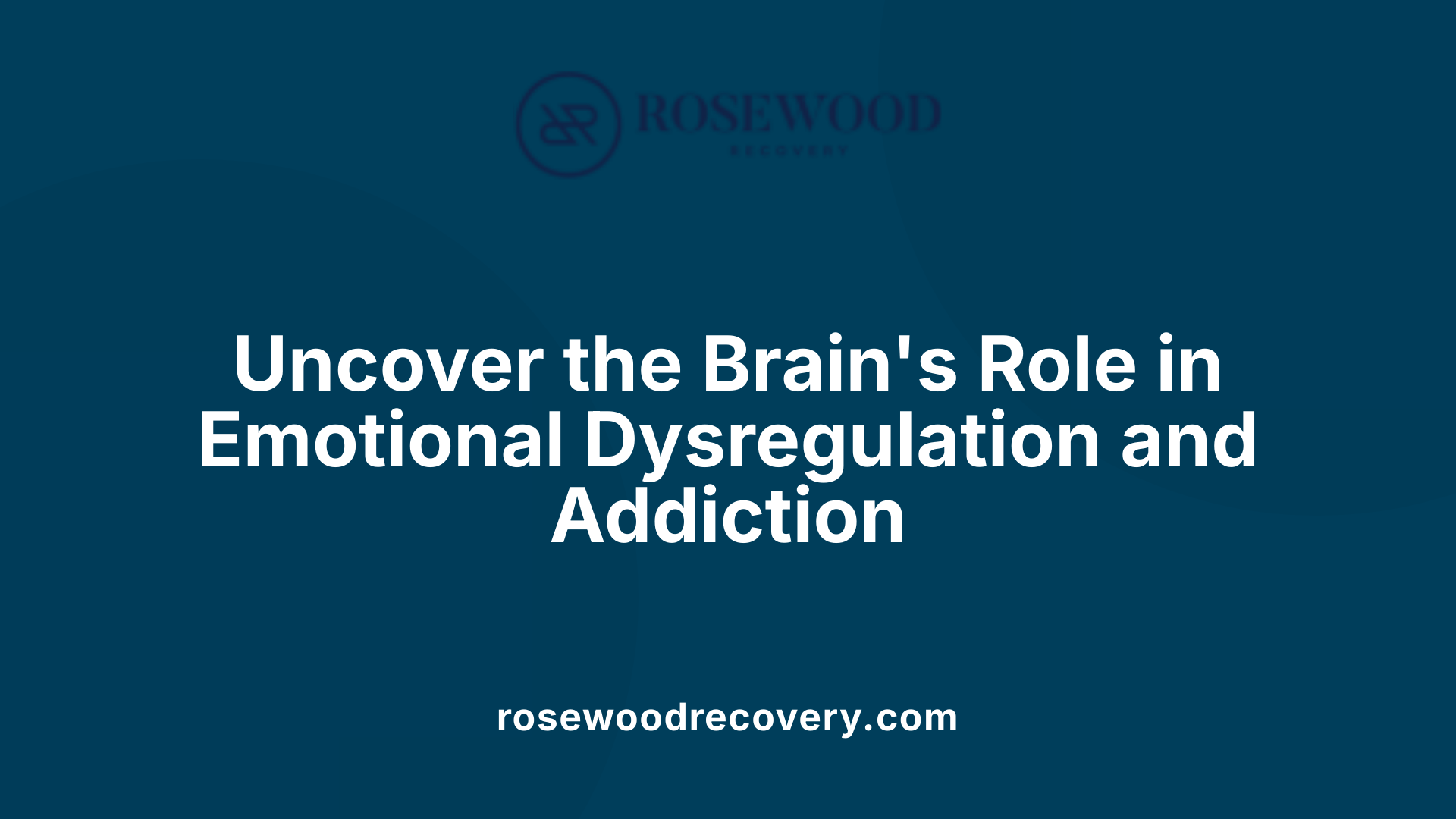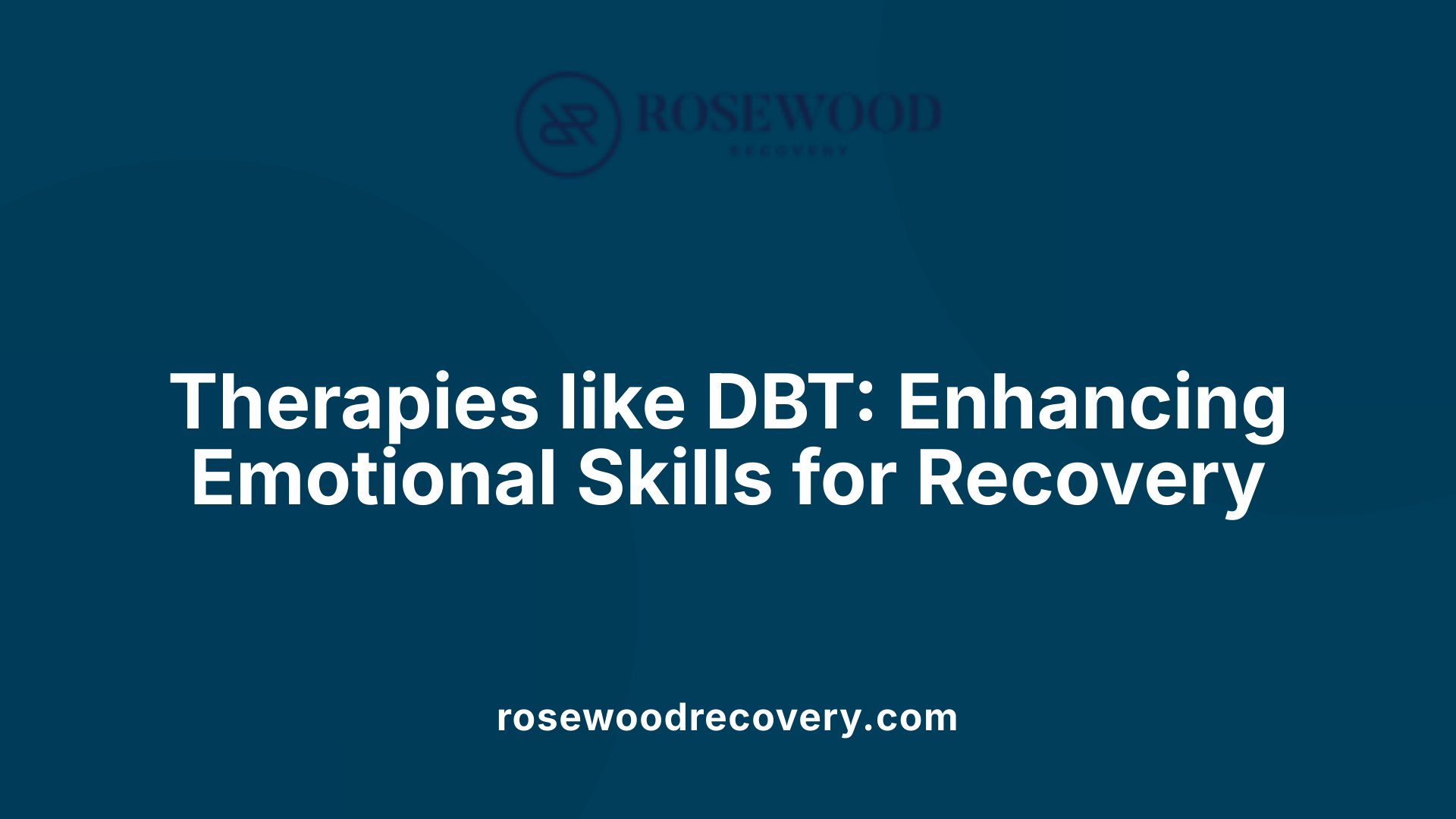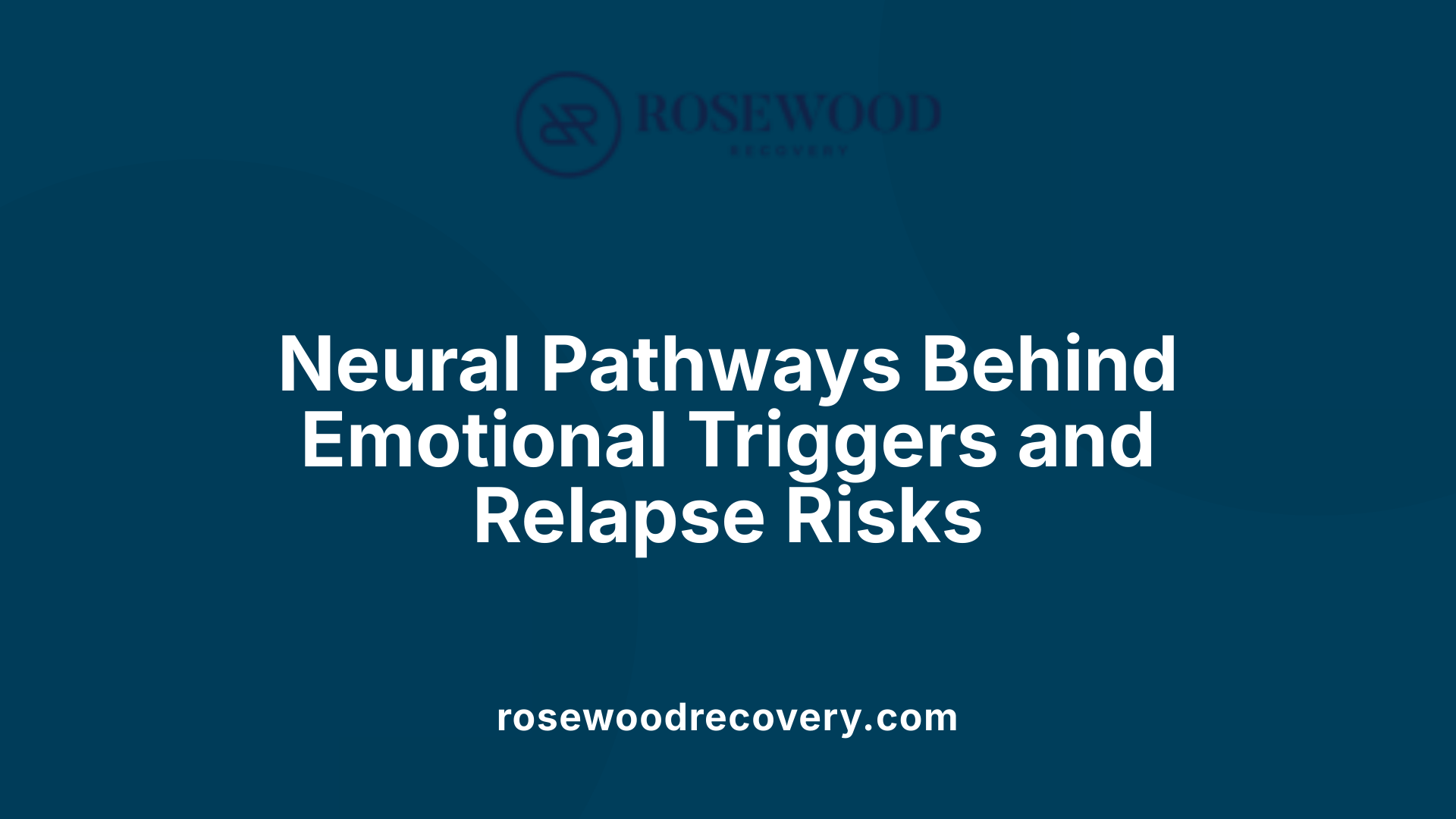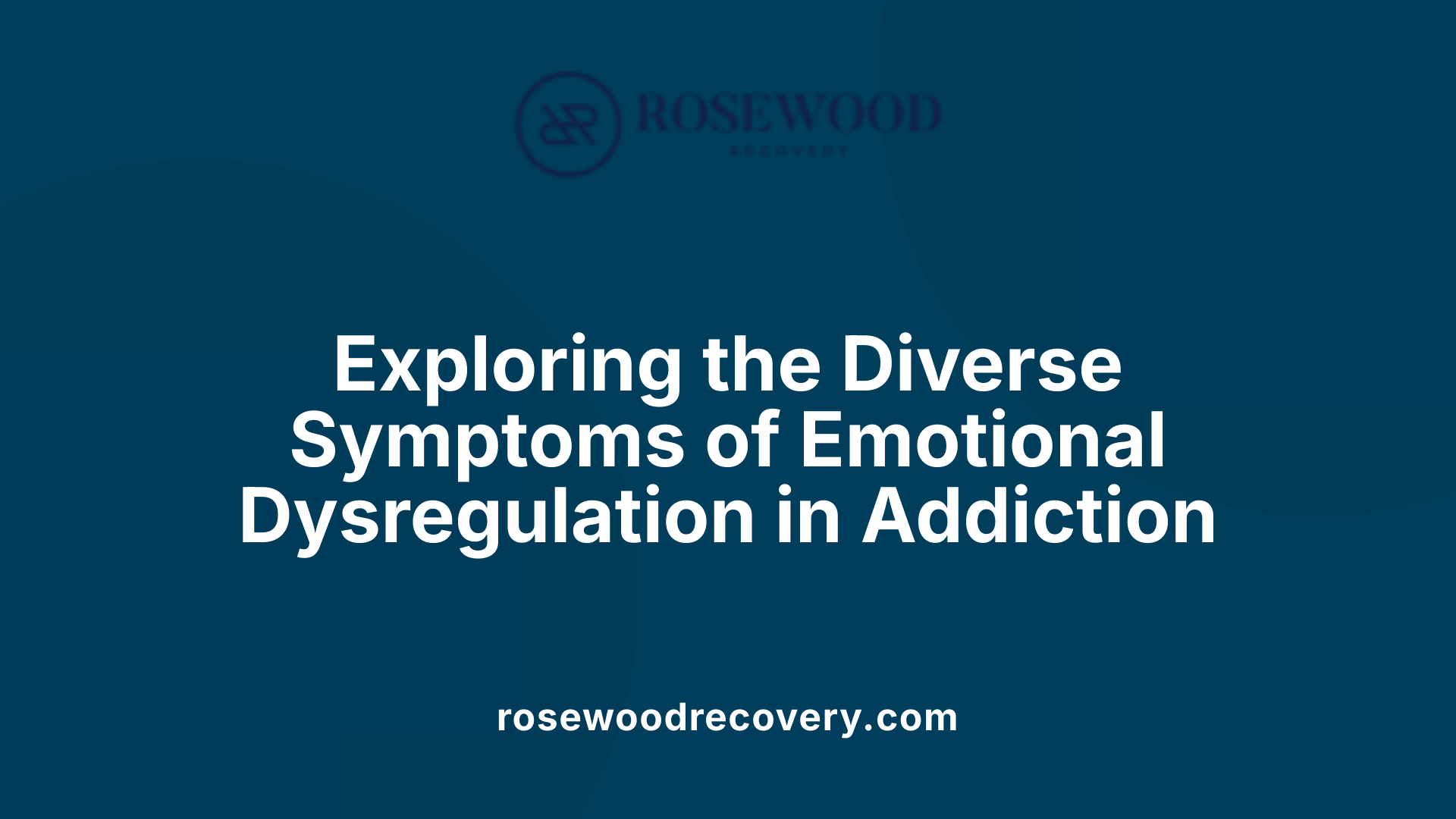Unveiling the Complex Interplay Between Emotions and Substance Use
Understanding the role of emotional dysregulation in substance use disorders (SUDs) is crucial for developing effective treatments. This article explores the manifestation, neural underpinnings, and therapeutic strategies addressing emotional dysregulation in addiction, offering insights supported by scientific research.
Defining Emotional Regulation and Dysregulation in SUDs
Can you explain emotional regulation and dysregulation within the context of substance use disorders?
In the realm of substance use disorders (SUDs), emotional regulation is the capacity to effectively manage and respond to emotional experiences. It involves understanding, differentiating, and controlling emotions to maintain emotional equilibrium. Conversely, emotional dysregulation refers to persistent difficulties in controlling one’s emotional responses, leading to intense, prolonged emotional reactions and impulsive behaviors.
People with SUDs often display significant impairments in emotional regulation. They struggle to access effective coping strategies and exhibit impulsivity, especially when upset. These challenges can escalate their substance use as a maladaptive attempt to manage overwhelming emotions. Research shows that individuals with SUDs have higher difficulties across various aspects of emotion regulation, including impulse control and emotional awareness.
This dysregulation can create a 'crowding out' effect, where drug-related emotions dominate, making it harder for individuals to experience or pursue other emotional goals. Such persistent emotional struggles contribute to the cycle of addiction, with drug use serving as a form of self-medication.
Addressing emotional dysregulation is vital in treatment. Therapies like Dialectical Behavior Therapy (DBT) focus on enhancing skills such as mindfulness, distress tolerance, and emotional awareness. Improving these abilities can reduce impulsivity, help manage emotional responses better, and decrease the likelihood of relapse.
Overall, improving emotional regulation not only alleviates the emotional difficulties associated with SUDs but also supports autonomy and decision-making capacity. Tackling dysregulation may lead to better treatment outcomes and sustained recovery.
Manifestations of Emotional Dysregulation in SUDs
How does emotional dysregulation manifest in individuals with substance use disorders?
Individuals with substance use disorders (SUDs) often display a range of symptoms indicative of emotional dysregulation. These include intense emotional reactions that are difficult to manage, leading to frequent mood swings and prolonged emotional responses. Such individuals frequently struggle to calm down after experiencing strong emotions, which can result in impulsive behaviors such as reckless drug use or other risky activities as maladaptive coping strategies.
Chronic feelings of emptiness, dissociation, and heightened stress sensitivity are common, further complicating emotional management. These symptoms can perpetuate a cycle where emotional instability fuels substance use, and ongoing drug dependence worsens emotional regulation difficulties.
Neurobiological differences underpin these behavioral patterns. Studies highlight altered activity in brain regions like the amygdala, insula, and prefrontal cortex, which are involved in emotional processing and regulation. For example, some substances are associated with reduced activity in emotional response areas, while others show heightened responses, contributing to emotional instability.
Overall, emotional dysregulation serves both as a precursor and an outcome of substance dependence. This cyclical relationship hampers recovery efforts and emphasizes the importance of addressing emotional regulation in treatment approaches.
The Link Between Emotional Dysregulation and SUDs
How does emotion dysregulation influence substance use behaviors?
Individuals with substance use disorders (SUDs) experience significant difficulties in managing their emotions, a phenomenon known as emotional dysregulation. This challenge is evident across all facets of emotional regulation, with the largest deficits seen in the Strategies and Impulse subscales of assessment tools like the Difficulties in Emotion Regulation Scale (DERS). People often turn to substances such as alcohol, opioids, methamphetamine, or cocaine as maladaptive coping mechanisms to manage their intense or distressing emotions.
Research shows that those with SUDs are more likely to use expressive suppression—an emotion regulation strategy—in comparison to controls. This tendency correlates with higher emotion regulation difficulties, further fueling the cycle of emotional instability and substance use. Moreover, emotional dysregulation is linked with greater impulsivity, increased substance use frequency, and severity of dependence.
What is the relationship between emotional dysregulation and substance use disorders?
The connection between emotional dysregulation and SUDs is complex and bidirectional. Higher levels of dysregulation tend to contribute to the development and persistence of addictive behaviors. When emotional regulation fails, substances serve as a shortcut to temporarily dampen negative feelings, but this often results in dependence and worsened emotional state over time.
This persistent emotional dysregulation impairs autonomy, as it hampers the capacity to control behaviors and make rational decisions. Many addicts remain 'willing users'—despite their desire to cease—because their emotional regulation capacities are compromised. Additionally, neurobiological studies indicate dysregulation in brain regions involved in emotional processing, such as the amygdala, insula, anterior cingulate cortex, and prefrontal cortex.
Contribution to relapse and severity
Difficulties in emotion regulation are closely associated with relapse risk. During withdrawal or negative affective states, individuals with SUDs often display heightened reactivity in emotional brain regions, which can trigger drug-seeking behavior. Severity indicators, including the frequency of substance use and dependence levels, are also linked to greater emotion dysregulation.
Interventions like Dialectical Behavior Therapy (DBT) and Cognitive Behavioral Therapy (CBT) focus on enhancing emotional regulation skills. Addressing these deficits can reduce impulsivity and improve treatment outcomes, ultimately helping individuals regain control over their behaviors and reduce the chances of relapse.
| Aspect | Description | Additional Details |
|---|---|---|
| Common Dysregulation Features | Intense emotional reactions, impulsivity, mood swings | Leads to maladaptive behaviors such as drug use or other addictions |
| Brain Regions Involved | Amygdala, insula, anterior cingulate cortex, prefrontal cortex | Dysregulation causes difficulty in emotional processing and regulation |
| Impact on Treatment Outcomes | Higher emotion dysregulation predicts poor adherence and increased relapse risk | Emphasizes the importance of emotion regulation strategies in therapy |
| Associated Behavioral Addictions | Social media addiction, gaming, gambling | Similar emotional dysregulation patterns observed, with impulsivity as a factor |
Understanding and addressing emotional dysregulation not only helps in treating SUDs but can also prevent relapse and reduce the severity of addiction. Enhancing emotion regulation abilities remains a crucial component of effective addiction treatment.
Theories and Scientific Findings on Emotional Dysregulation in Addiction
What are the scientific findings and theories regarding emotional dysregulation in addiction?
Research consistently shows that emotional dysregulation plays a crucial role in the development and persistence of addiction. Individuals with substance use disorders (SUDs) tend to struggle significantly with managing their emotions, often resorting to substances as maladaptive coping mechanisms.
Neurobiological studies have identified specific alterations in brain circuits involved in emotion regulation. For example, hyperactivity in the amygdala and changes in the prefrontal cortex create a situation where emotional responses become intense and poorly controlled. This neural imbalance hinders decision-making and impulse control, making it harder for affected individuals to regulate their emotional responses effectively.
Several theoretical models help explain how emotional dysregulation links to addiction. The incentive sensitization theory suggests that repeated drug use heightens the brain’s response to drug-related cues, leading to intense cravings fueled by emotional triggers. Similarly, the reward deficiency hypothesis posits that individuals with under-responsive reward systems seek out drugs to compensate for their diminished natural pleasure, often driven by their emotional vulnerabilities.
Other models emphasize the interplay between stress dysregulation and emotional control. Chronic stress can impair emotional regulation further, creating a cycle where stress-related emotional dysregulation increases the likelihood of substance use, which then worsens neurobiological deficits.
Overall, these findings highlight that emotional dysregulation is both a consequence and a driver of addiction. It undermines an individual’s autonomy by impairing rational decision-making and fosters ongoing substance dependence. Addressing these emotional and neurobiological factors is essential for developing more effective treatment strategies.
Neural and Neuroimaging Insights into Emotional Dysregulation

What does neural and neuroimaging research reveal about emotional dysregulation in substance dependence?
Neuroimaging studies provide valuable insights into the brain mechanisms underlying emotional dysregulation in individuals with substance use disorders (SUDs). These investigations consistently show that certain brain regions involved in emotion processing, regulation, and interoception are dysregulated in addiction.
Key areas affected include the amygdala, insula, anterior cingulate cortex (ACC), and medial prefrontal cortex (mPFC). Typically, people with SUDs exhibit reduced activity in the prefrontal regions responsible for exerting control over emotions and impulses, which impairs their ability to regulate emotional responses effectively.
Conversely, regions involved in generating and processing emotions, such as the amygdala and insula, often show altered activity depending on the substance involved. For instance, alcohol dependence tends to show blunted activation in emotion-related areas, indicating decreased sensitivity to emotional stimuli. In contrast, cocaine dependence usually features heightened reactivity during emotional reappraisal and stress responses, reflecting amplified limbic system activity.
Different substances are associated with specific neural patterns. Opioid dependency, for example, is linked with increased activity in the amygdala during treatment phases, whereas during abstinence, decreased activity is observed, signifying dynamic changes based on treatment status.
Furthermore, disrupted connectivity between emotion-generating regions and prefrontal control areas underpins many aspects of emotional dysregulation. This impaired communication hampers the ability to manage negative emotions, thereby increasing vulnerability to relapse.
Overall, these findings highlight that deficits in prefrontal regulation and exaggerated limbic responses are central to emotional dysregulation in addiction. Recognizing these neural alterations underscores the importance of developing targeted treatments—possibly including pharmacological, behavioral, or neuromodulation strategies—that aim to restore proper brain function and improve emotion regulation capabilities in people with SUDs.
Psychological and Neurobiological Perspectives on Addiction Behaviors
How is emotional dysregulation connected to addiction behaviors from a psychological and neurobiological perspective?
Emotional dysregulation plays a significant role in the development and persistence of addiction through complex psychological and neurobiological pathways. Psychologically, individuals with difficulty managing intense or prolonged emotions are more prone to impulsive behaviors, including substance use. This maladaptive emotional response often leads to reliance on drugs or behavioral addictions as coping mechanisms, which temporarily alleviate negative feelings but ultimately exacerbate emotional problems.
Neurobiologically, addiction involves disruptions in critical brain circuits responsible for emotion regulation, decision-making, and reward processing. Key regions like the prefrontal cortex (PFC), amygdala, and extended amygdala become dysregulated. The PFC, which normally helps in impulse control and rational decision-making, shows impaired functioning in individuals with addiction, diminishing their capacity to regulate impulses and emotions effectively.
Simultaneously, the amygdala and extended amygdala, involved in stress responses and processing negative emotions, tend to become hyperactive. This heightened activity amplifies stress and emotional reactivity, increasing the likelihood of drug cravings during negative emotional states.
Advanced neuroimaging studies reveal that these neural alterations lead to exaggerated responses to drug-related cues, a diminished ability to experience pleasure from natural rewards, and increased vulnerability to relapse, particularly during withdrawal or stressful situations. Furthermore, changes in reward-related areas like the nucleus accumbens and basal ganglia reinforce compulsive drug-seeking behaviors.
Overall, the convergence of psychological impairments and neurocircuitry dysfunctions due to emotional dysregulation creates a cycle that sustains addiction. Addressing these underlying mechanisms through targeted therapies can improve treatment outcomes, making emotional regulation strategies an integral part of addiction recovery programs.
Treatment Strategies Targeting Emotional Dysregulation

What treatment approaches, such as Dialectical Behavior Therapy (DBT), target emotional dysregulation in substance use disorders?
To address the emotional regulation difficulties seen in individuals with substance use disorders (SUDs), several therapeutic approaches have been developed and studied. Among these, second- and third-wave cognitive-behavioral therapies stand out as particularly effective.
Dialectical Behavior Therapy (DBT) is a prominent example. Originally designed for borderline personality disorder, DBT emphasizes mindfulness, emotional regulation, distress tolerance, and interpersonal effectiveness. Its focus on developing skills to identify and manage intense emotions makes it especially suitable for SUD populations struggling with emotional dysregulation.
Mindfulness-based interventions also play a significant role. These practices cultivate present-moment awareness and acceptance of emotional experiences, helping individuals become more attuned to their feelings without reacting impulsively.
Acceptance and Commitment Therapy (ACT) is another promising approach. It encourages acceptance of difficult emotions and urges individuals to commit to actions aligned with their values, fostering healthier emotional responses and reducing reliance on substances for coping.
These therapies typically involve skills training, psychoeducation, and exercises that enhance emotional awareness and management. Formats vary from brief sessions to more comprehensive programs and can be delivered in person or online.
Effectiveness and evidence
Research shows that these targeted interventions can significantly improve emotional regulation in people with SUDs. Participants often exhibit reductions in emotional dysregulation scores and decreases in substance use behaviors.
Meta-analyses support the effectiveness of these approaches across diverse populations and substances, including alcohol, opioids, stimulants, and behavioral addictions like gambling or gaming.
However, while promising, the field still calls for additional high-quality studies. This ongoing research aims to optimize intervention protocols, tailor them to specific subgroups, and confirm long-term benefits.
Overall, addressing emotional dysregulation through tailored therapies enhances treatment outcomes, helping individuals manage their emotions better and maintain sobriety.
Implications of Emotional Dysregulation on Autonomy and Decision-Making

How is emotional dysregulation connected to addiction behaviors from a psychological and neurobiological perspective?
Emotional dysregulation plays a significant role in the development and persistence of addiction behaviors. Psychologically, it leads to increased impulsivity and difficulty managing negative emotions, which can drive individuals to seek relief through substance use or other addictive activities. The inability to regulate emotions effectively results in compulsive drug-seeking behaviors, often serving as a maladaptive strategy to cope with intense feelings.
Neurobiologically, emotional dysregulation involves dysfunction in crucial brain circuits. Key regions such as the prefrontal cortex (PFC), amygdala, and extended amygdala are affected. Impairments in the PFC reduce decision-making ability and impulse control, making it harder for individuals to weigh long-term consequences over immediate gratification. The amygdala and extended amygdala become hyperactive, heightening stress responses and negative emotions, which further predispose individuals to seek substances for relief. Additionally, alterations in reward pathways, including areas like the nucleus accumbens, diminish natural pleasure responses, resulting in a reliance on drugs to achieve emotional homeostasis.
These neural changes create a cycle where exaggerated responses to drug cues and diminished capacity to experience natural rewards increase vulnerability to relapse, especially during withdrawal periods. Overall, the intertwining of psychological vulnerabilities and neurobiological dysfunctions explains how emotional dysregulation sustains addictive behaviors, impairing autonomy and making recovery more challenging.
What is the relevance of these insights for clinical and research settings?
Understanding the relationship between emotional dysregulation and addiction underscores the importance of targeting emotional regulation strategies within treatment programs. Interventions such as Dialectical Behavior Therapy (DBT) and Cognitive Behavioral Therapy (CBT) can help improve emotion regulation skills, thereby reducing impulsive behaviors and enhancing decision-making capacity.
In research, these insights highlight the need to further explore neural mechanisms underlying emotional dysregulation in addiction. Studying brain regions involved in emotional processing, such as the amygdala, insula, and prefrontal cortex, can offer biomarkers for vulnerability and treatment response. Moreover, integrating neuroimaging and behavioral data can lead to more personalized interventions.
In clinical and research contexts, addressing emotional dysregulation not only aids in reducing substance use but also helps preserve or restore individuals' autonomy. Recognizing how addiction impairs decision-making and emotional control can improve ethical considerations in treatment, rehabilitation, and participation in clinical studies. Ultimately, enhancing emotional regulation capabilities may support better outcomes and facilitate recovery, reinforcing the crucial link between mental health, neurobiology, and autonomous functioning.
The Role of Negative Emotional Processing and Brain Circuits in Relapse

What does neural and neuroimaging research reveal about emotional dysregulation in substance dependence?
Neuroimaging studies provide valuable insights into how emotional dysregulation manifests in the brains of individuals with substance use disorders (SUDs). These studies highlight that key brain regions involved in emotional processing and regulation, including the amygdala, insula, anterior cingulate cortex (ACC), and medial prefrontal cortex (mPFC), show altered activity patterns in addiction.
In many cases, individuals with SUDs exhibit decreased activity in prefrontal areas responsible for regulating emotions and controlling impulses. This reduction impairs their ability to manage emotional responses effectively, which can contribute to relapse or continued substance use.
Responses in limbic regions like the amygdala and insula, responsible for processing emotional stimuli, vary across different substances. For example, alcohol dependence tends to show blunted activation in these regions, indicating diminished emotional reactivity or processing capacity. Conversely, cocaine dependence often involves heightened activation, reflecting increased emotional reactivity and stress sensitivity.
Substance-specific differences are also evident: opioid dependence frequently correlates with increased amygdala activity, while alcohol dependence shows generalized reductions across emotion-related regions. This variation suggests that each substance may uniquely affect brain circuits involved in emotional regulation.
Disrupted connectivity between emotion-generating regions and regulatory areas exacerbates emotional dysregulation. Such neural disconnections hinder the brain’s ability to modulate emotional responses, fostering a cycle where emotional dysregulation prompts drug use as a coping mechanism.
Understanding these neural mechanisms emphasizes the importance of targeting brain circuit dysfunctions through tailored treatments. Enhancing prefrontal regulation or dampening limbic hyperactivity via pharmacological or neuromodulation techniques could improve emotional stability and reduce relapse risk in individuals with SUDs.
Emotional Dysregulation and Behavioral Addictions
How does emotional dysregulation relate to non-drug addictions like gambling and social media?
Emotional dysregulation is not limited to substance use disorders; it also significantly impacts behavioral addictions such as gambling and social media use. Research shows that individuals struggling with these behaviors often face difficulties in managing their emotions, which can lead to impulsive actions and compulsive use.
In social media addiction, for example, factors like impulsivity, low self-esteem, and heightened anxiety contribute to problematic usage patterns. These individuals may use social media as a quick way to distract from or regulate negative emotions, illustrating an attempt at emotional regulation that becomes maladaptive.
Interventions targeting emotional regulation strategies, such as mindfulness and cognitive-behavioral techniques, have been shown to reduce problematic behaviors in these cases. Improving emotional awareness and control can help individuals develop healthier ways to cope with intense feelings and reduce their reliance on addictive behaviors.
Shared features of addiction and what treatment options exist
Both substance and behavioral addictions share core features, including impulsivity, difficulty controlling emotions, and a tendency to prioritize immediate relief over long-term well-being. Studies involving over 78,000 participants highlight that problems with emotion regulation are strong predictors of addictive behaviors, regardless of the specific substance or activity.
Notably, dimensions like impulsivity and poor emotional awareness are strongly linked to severity across both drug and non-drug addictions. This understanding guides treatment strategies, emphasizing the need for approaches that target emotional regulation.
Interventions such as Dialectical Behavior Therapy (DBT) and specific cognitive-behavioral therapies are utilized to improve emotional regulation skills. These therapies aim to help individuals recognize emotional triggers, develop healthier responses, and ultimately reduce their addiction-related behaviors.
A summarized comparison of addiction types, associated emotional dysregulation aspects, and treatment focus areas is presented below:
| Addiction Type | Core Emotional Dysregulation Features | Treatment Focus | Severity Relative to ED |
|---|---|---|---|
| Substance Use (alcohol, opioids, etc.) | Impulsivity, emotional instability, poor strategies | Improving impulse control, emotional awareness | Higher in clinical samples |
| Non-drug (social media, gambling) | Impulsivity, low self-esteem, anxiety | Emotional regulation training, mindfulness | Similar core features |
Understanding the shared mechanisms underlying diverse addictive behaviors underscores the importance of targeting emotional dysregulation in treatment. By enhancing emotional resilience, individuals may better manage vulnerabilities that lead to addiction, whether to substances or behaviors.
The Multifaceted Nature of Emotional Dysregulation in Addiction

What symptoms of emotional dysregulation are associated with addiction?
Symptoms of emotional dysregulation are diverse and impactful, especially in the context of addiction. They include intense emotional reactions and frequent mood swings that can make emotional states unpredictable. Individuals often find it challenging to calm down after emotional disturbances, leading to impulsive behaviors like reckless decision-making or substance use.
Chronic feelings of emptiness or dissociation are common, contributing to a sense of detachment from oneself or surroundings. Relationships may become unstable and intense, driven by difficulty managing emotional responses.
Self-critical thoughts and persistent negative beliefs can exacerbate emotional pain, fueling the cycle of maladaptive coping strategies such as substance use. Many individuals also struggle with expressing emotions effectively and demonstrate heightened sensitivity to stress, which can trigger relapse or further emotional instability.
In addicts, these symptoms often reinforce each other, creating a cycle where emotional dysregulation fuels increased substance use. This maladaptive cycle not only worsens mental health but also complicates recovery.
Recognizing these symptoms is essential for treatment. Interventions that target emotional regulation, including therapies like Dialectical Behavior Therapy (DBT) and Cognitive Behavioral Therapy (CBT), aim to improve individuals' ability to understand, differentiate, and control their emotions. Addressing these symptoms directly enhances the chances of sustainable recovery by reducing impulsive behaviors and improving emotional stability.
The Impact of Emotional Dysregulation on Autonomy and Decision-Making in Severe Addiction
How is emotional dysregulation connected to addiction behaviors from a psychological and neurobiological perspective?
Emotional dysregulation plays a significant role in both the development and persistence of substance use disorders. Psychologically, individuals with emotional dysregulation tend to experience intense, prolonged emotional responses, impulsivity, and difficulty in controlling impulses, especially when upset. These traits can lead to using drugs as maladaptive coping strategies, where substances temporarily alleviate emotional distress but ultimately reinforce dependency.
Neurobiologically, dysregulation involves disruptions in key brain circuits responsible for emotion regulation, impulse control, and reward processing. Regions such as the prefrontal cortex (PFC), which is crucial for rational decision-making and self-control, often show impaired functioning. The amygdala and the extended amygdala, central to processing stress and negative emotions, tend to be hyperactive, heightening emotional responses and stress reactivity.
Alterations in reward-related areas, like the nucleus accumbens and basal ganglia, make individuals more sensitive to drug cues and diminish sensitivity to natural rewards. This neural imbalance fosters exaggerated responses to drug-related stimuli, craving, and increased risk of relapse.
Together, these psychological and neurobiological mechanisms interact to reinforce compulsive drug-seeking behaviors. Emotional dysregulation not only heightens vulnerability during withdrawal and craving stages but also impairs the brain's capacity to regulate emotions and make autonomous choices, complicating recovery efforts.
Toward More Effective Treatments and Better Outcomes
Addressing emotional dysregulation is paramount in understanding and treating substance use disorders. Advances in neuroimaging elucidate the neural basis of these difficulties, while evidence-based therapies like DBT and mindfulness training demonstrate promise in improving emotional regulation, reducing relapse, and fostering autonomous decision-making. Continued research and tailored interventions hold the key to breaking the cycle of addiction driven by emotional dysregulation, ultimately leading to more successful recovery pathways.
References
- Emotion regulation in substance use disorders
- Editorial: The role of emotional dysregulation in addiction
- Emotion dysregulation in participants with substance use ...
- Emotional dysregulation in relation to substance use and ...
- Emotional Dysregulation & Addiction - Banyan Mental Health
- emotional dysregulation is a critical driver of relapse to ...
- The Link between Drug Addiction and Emotional Dysregulation
- Addiction and autonomy: Why emotional dysregulation in ...


.jpeg)

